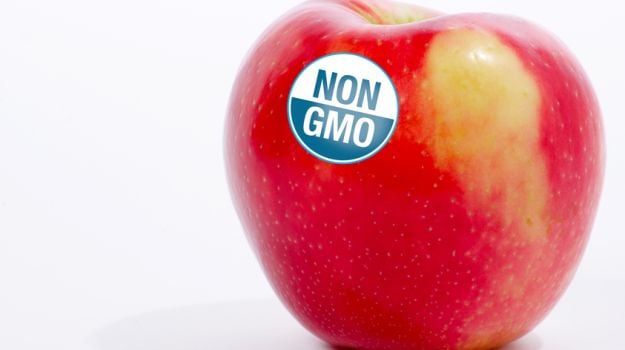After years of fierce debate involving scientists, food manufacturers, farmers and environmental groups, Congress has just passed a bill that would make it mandatory to inform consumers about the GMOs - or genetically modified organisms - in their food. The bill would require food companies to disclose whether their products contain genetically modified ingredients, whether in the form of a label or a scannable QR code on the packaging. Reports suggest that President Barack Obama is expected to sign it.
The bill has been quick to stir the continued controversy about the safety of genetically engineered crops and a consumer's right to avoid them. But if the politics surrounding GMOs are complicated, the attitudes of everyday Americans toward them may be even more so. The new bill comes right on the heels of a recent survey, conducted by researchers from the University of Pennsylvania's Annenberg Public Policy Center and the University of Wisconsin-Madison's Department of Life Sciences Communication, suggesting that most Americans support mandatory labeling laws - but they also don't know much about the science behind GMOs to begin with.
The idea of mandatory GMO labeling has been pushed by organic farmers and certain environmental groups in the U.S. for years. Many of these organizations have argued that the safety of GMOs is uncertain, and that genetically modified foods could pose a risk both to the environment and to the health of consumers.
Those on the other side of the fence, including food companies and farming organizations, have pointed out that most scientists agree there is no concrete evidence to suggest that GMOs pose a risk. In fact, the National Academy of Sciences recently released a report summarizing years of research on genetically engineered crops.
The report concluded that there was "no substantiated evidence of a difference in risks to human health between currently commercialized genetically engineered (GE) crops and conventionally bred crops, nor did find conclusive cause-and-effect evidence of environmental problems from the GE crops." However, it also pointed out that this doesn't necessarily mean all future GE plants will be safe and recommended that all newly introduced crops undergo safety testing.
But the new survey suggests that most Americans don't have a solid understanding of the science behind GMOs at all. Conducted as part of the Annenberg Science Knowledge survey project, the survey included more than 1,000 participants throughout the country. Surveys were conducted by telephone and included six questions on GMO labeling and the safety of genetically modified crops.
Altogether, 88 percent of participants said they thought products containing GMOs should be labeled, and 91 percent said they thought people had a right to know if they were buying or eating products containing GMOs. This is in keeping with multiple surveys conducted by other organizations that have indicated wide support for GMO labeling.
However, in the new survey, 58 percent of respondents also said they had only a fair or poor understanding of GMOs, compared with 40 percent of respondents who thought they had a good or excellent understanding.
Additionally, 48 percent of respondents either disagreed or strongly disagreed with the idea that scientists have not found any risks to human health from eating genetically modified foods, as opposed to just 22 percent who agreed or strongly agreed (and 29 percent who neither agreed nor disagreed or just didn't know). These results not only suggest a large proportion of Americans hold factually incorrect beliefs about GMOs, but were also somewhat at odds with responses to the next question, in which 39 percent of respondents agreed or strongly agreed that GMOs are safe to eat, while only 27 percent disagreed or strongly disagreed.
The differences between these two responses, in particular, may help reveal some complexities in the way the American public feels about GMOs, said Dominique Brossard, chair of the Department of Life Sciences Communication at the University of Wisconsin-Madison, who was involved in the survey's design and analysis. (Brossard was also a committee member involved with the recent National Academy of Sciences report on genetically engineered crops.) These results suggest that some people believe scientists disagree about the safety of GMOs - but are still willing to eat them, anyway.
It's still incorrect to assume that there's no scientific consensus on the issue, when the National Academy of Sciences report suggests otherwise (and scientists had broadly agreed on the safety of GMOs for years before that report's release). And this is a problem, according to Brossard.
"I am actually concerned about the fact that only one in five people know that scientists have not found evidence of adverse side effects [of genetically engineered crops]," she said, adding that these results may speak to the overall confusion Americans feel about the topic - an issue that's likely been exacerbated by the widespread and highly publicized debate among various organizations in the country.
"There are a lot of groups that have been very vocal one way or the other, and I think we have confused the American public on this issue," she said.
But she added that fears about the safety of GMOs are not necessarily the only driving force behind support for mandatory labeling. Some consumers may be more suspicious about what they perceive as "corporate agendas" and support labeling in the interest of transparency - or they may simply feel that consumers have a right to know what's in their food, regardless of the consensus on its safety.
In any case, the new labeling bill is hardly expected to dispel the controversy surrounding GMOs. Reports already suggest that groups on both sides of the fence have expressed dissatisfaction with its terms - some feel that it flies in the face of accepted scientific views, while others feel it isn't strict enough.
But in the midst of all the debate and confusion, there may now be an opportunity for better discussion on the science behind genetic engineering.
"Media coverage has focused a lot on that question of consensus and health risk," Brossard said. "It will be interesting to see how this develops as the labeling issue develops and comes into play."
(c) 2016, The Washington Post(This story has not been edited by NDTV staff and is auto-generated from a syndicated feed.)










